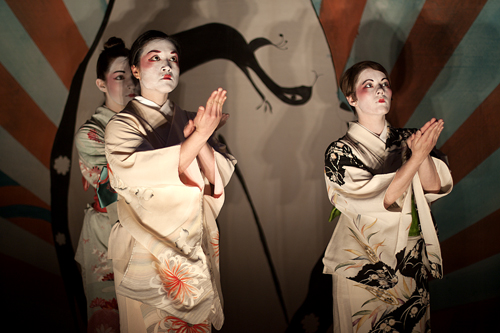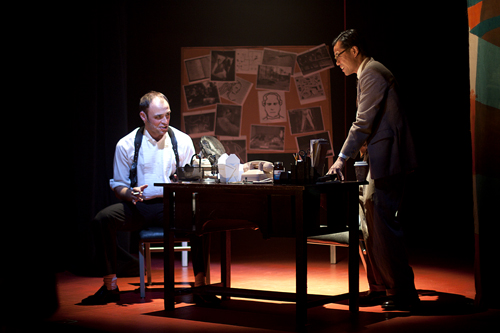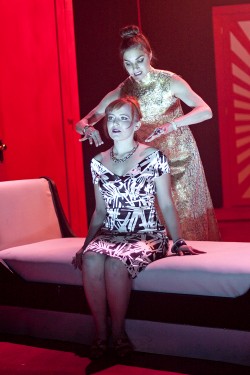Freud famously said that perverts succeed in realizing what hysterics only fantasize about. Imago Theatre’s superb staging of Yukio Mishima’s The Black Lizard is full of the perverse and the hysterical. The classic tropes of the hard-boiled detective procedural are employed brilliantly in this sexy, surrealistic noir thriller.

The Black Lizard is a fast-paced, suspenseful tale of kidnapping and ransom, in which Japan’s most infamous jewel thief, known as “Black Lizard,” kidnaps the daughter of a wealthy Osaka jeweler. But things don’t go as planned, and the stakes in this game of extortion change when Black Lizard squares off with the handsome hero, Akechi Kogoro.
Friday’s opening was the first time that the classic Japanese play was performed in English. The script was translated by Mark Oshima and Portland State Professor of Japanese language and literature Laurence Kominz.
When the celebrated Japanese author, essayist and playwright Yukio Mishima adapted Edogawa Rampo’s classic detective novel for the stage in 1961, he departed somewhat from his usual style. Leaving behind his more formal avant-garde leanings, Mishima crafted a gritty piece of pulp fiction that hinged on an improbable love story between Japan’s greatest fictional detective, Akechi Kogoro, and a master criminal calling herself Black Lizard.

Just beneath the surface of this gripping tale of crime, eroticism and fantasy are layers of Mishima’s own lifelong obsessions: youth, beauty, death and the illumination of the beauty that dwells in ugliness and the horror found in beauty.
Mishima was famously obsessed with youth, beauty and physique as well as intellectual pursuits, and on those points Imago has surely pleased Mishima’s ghost. Matt DiBiasio is full of charisma and swagger as the handsome, crime-obsessed hero, Akechi, and Anne Sorce shines in her role as the titular character.
The audience is immediately seduced by Sorce’s Black Lizard, who offers an unforced, boldly erotic performance.
The lead actors are so powerful that their absence is acutely noticeable when neither occupies the stage. Thankfully, this rarely occurs, and the entire cast gives laudable performances.
Imago’s bold production, directed by Jerry Mouawad, perfectly captures the vitality, depravity and eroticism of Mishima’s intense vision (complete with full-frontal nudity). The clever staging employs a multimedia chase scene, brilliantly designed sets and wonderful costuming to produce a mood and pacing that immerses the audience in the “erotic grotesque nonsense” aesthetic.

This movement, popular in Japan in the 1930s, sought to transform the pornographic, meaningless and unseemly into vital representations of culture springing forth from deprivation. The high and the low, the vulgar and the sublime, all become equally striking in this aesthetic.
Mouawad understands this aesthetic and isn’t afraid to reach beyond the accepted conventions of the crime drama to achieve the necessary contrast. In fact, Imago’s The Black Lizard suggests in equal measure the surreal quality of David Lynch and the anarchic Technicolor aesthetic of Seijun Suzuki.
For the western audience, David Lynch’s shadow may loom. But while the music, lighting and monologue treatment is reminiscent of Lynch, the real bridge between Lynch and The Black Lizard can be found in their respective attitudes toward fantasy. Both seem to exalt characters that become obsessed with fantasy, meanwhile presenting terrifying visions of what it means to realize one’s fantasy.
The closer these characters come to achieving their fantasy, the more dangerous they become to themselves and to others. The fulfillment of our innermost desires, it would seem, is nightmarish. This is consistent with Mishima’s own obsession with ritual suicide, which he fulfilled publicly in 1970 when he committed seppuku.
At the height of his powers, Mishima was able to excite the intellect, the imagination and the prurient interests of an audience with tales as sexy and thrilling as they were thoughtful. Imago’s The Black Lizard is a rare gem that shines with all of the brilliance of its author in his prime.
Showing through June 2
Thursdays 7:30 p.m.;
Fridays and Saturdays 8 p.m.
Imago Theatre
17 SE Eighth Ave.
Tickets $15–30

